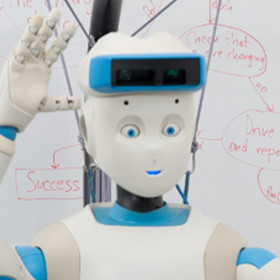
Workshop on Cognitive Architectures for HRI: Embodied Models of Situated Natural Language Interactions
(MM-Cog)
Click here for the program and the contributions.
The workshop will take place in conjunction with the International Conference on Autonomous Agents and Multiagent Systems (AAMAS 2019) in Montreal, Canada on the 13th of May
In many application fields of human robot interaction, robots need to adapt to changing contexts and thus be able to learn tasks from non-expert humans through verbal and non-verbal interaction. Inspired by human cognition and social interaction, we are interested in mechanisms for representation and acquisition, memory structures etc., up to full models of socially guided, situated, multi-modal language interaction. These models can then be used to test theories of human situated multi-modal interaction, as well as to inform computational models in this area of research.
The workshop aims at bringing together linguists, computer scientists, cognitive scientists, and psychologists with a particular focus on embodied models of situated natural language interaction. Workshop submissions should answer at least one of the following questions:
Keynotes will be given by John Laird, Professor at the faculty of the Computer Science and Engineering Division of the Electrical Engineering and Computer Science Department of the University of Michigan, and Chen Yu, Professor at the Computational Cognition and Learning Lab at Indiana University.
Articles should be 4-6 pages, formatted using the AAMAS 2019 Author's Kit. For each accepted contribution, at least one of the authors is required to attend the workshop. Authors are invited to submit their manuscripts in PDF here.
Stephanie Gross, Austrian Research Institute for Artificial Intelligence, Vienna, Austria
Call for Papers
Relevant Topics include (but are not limited to) the following:
Invited Speakers
Important Dates
February 12 February 22, 2019March 10 March 20, 2019March 20 March 29, 2019Submission Instructions
Organizers
Brigitte Krenn, Austrian Research Institute for Artificial Intelligence, Vienna, Austria
Matthias Scheutz, Department of Computer Science at Tufts University, Massachusetts, USA
Matthias Hirschmanner, Automation and Control Institute at Vienna University of Technology, Vienna, Austria
